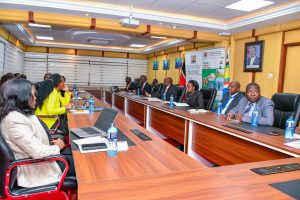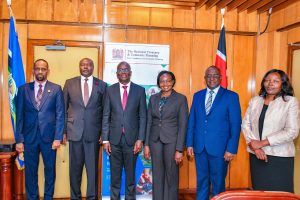Meeting On the Unified Ministerial Economic Planning Model
The State Department for Economic Planning (SDEP) and its Semi-Autonomous Government Agencies (SAGAs) on Tuesday, 19th August, 2025 held a consultative meeting with Commissioners from the Public Service Commission (PSC) at the Treasury Building.
Building on the discussions held previously by the PSC with HR Directors from Ministries and State Departments, the meeting focused on identifying key areas for improvement and developing strategies to address emerging challenges in the Public Service.
The PSC team led by Commissioner Francis Meja, did a comprehensive presentation highlighting key points including among others; the Human Resource recruitment plan and general guidelines, policies and regulations in line with Article 10, which outlines the National values and principles of governance and Article 232, which sets out the values and principles guiding the Public Service.
Additionally, Commissioner Meja emphasized on the importance of succession management, stressing that a well-planned approach is crucial for maintaining institutional continuity and stability.
“Whenever there is a vacancy let it be filled as soon as possible” he said, highlighting the need for prompt action to avoid disruptions in service delivery and ensure that the public service remains effective and efficient.
Speaking during the meeting, the Economic Planning Principal Secretary, Dr. Bonface Makokha expressed his appreciation for the proactive approach taken by the PSC team, commending them for taking a crucial step to visit Ministries, Departments and Agencies (MDAs) to share their concerns with us.
PS Makokha’s commendation underscored the importance of collaboration and communication in driving progress and addressing challenges in the public service sector.
The SDEP team, led by the Ag. Economic Planning Secretary (EPS) James Maina, delivered a detailed and insightful overview of the Unified Ministerial Economic Planning Model (U-MEPM). This model highlights the Department’s mandate, strategic objectives and key initiatives while providing a comprehensive look at its six Semi-Autonomous Government Agencies and the challenges faced.
A key takeaway from the presentation was the pressing need for new personnel to bolster the MDAs capacity alongside critical issues surrounding the review of Human Resource instruments, organizational structures and staff training.
These points resonated strongly, underscoring the importance of strategic human resource management in driving the Department’s objectives.
On the other hand, PS Makokha urged the Commission to work on the issues that arose during the meeting, emphasizing on the need for prompt action to address the concerns raised and ensure that the implementation of the plans and policies is not hindered.
He encouraged the team to prioritize the identified areas and develop effective solutions to drive progress.
Present during the meeting were; the PSC Commissioner, Irene Asienga, the SDEP Secretary Admin, Dr. Haron Komen, the KIPPRA Ag. Executive Director, Dr. Eldah Onsomu, the NCPD Director General, Dr. Mohamed Sheikh, the NEPAD C.E.O, Amb. Samori Okwiya, representatives from the NG-CDF, the KNBS and the Vision 2030, Directors from PSC, Directors from SDEP among others.





